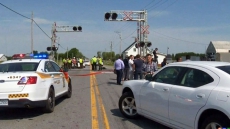An international team of scientists led by NASA's Center for Lunar Science and Exploration (CLSE), found evidence that the impact jettisoned material through Earth's primitive atmosphere, into space, where it collided with the surface of the Moon (which was three times closer to Earth than it is now) about 4 billion years ago.
The rock was subsequently mixed with other lunar surface materials into one sample.
The 2 gram fragment of rock was composed of quartz, feldspar, and zircon -- all commonly found on Earth and highly unusual on the Moon.
"It is an extraordinary find that helps paint a better picture of early Earth and the bombardment that modified our planet during the dawn of life," said David A. Kring, Principal Investigator at CLSE.
It is possible that the sample is not of terrestrial origin, but instead crystallised on the Moon.
That would, however, require the sample to have formed at tremendous depths, in the lunar mantle, where very different rock compositions are anticipated and in the reducing and higher temperature conditions characteristic of the Moon.
But chemical analysis of the rock fragment shows it crystallised in a terrestrial-like oxidised system, at terrestrial temperatures, according to research published in the journal Earth and Planetary Science Letters.
Further, the researchers revealed that the rock crystallised about 20 kilometres beneath the Earth's surface 4-4.1 billion years ago. It was then excavated by one or more large impact events and launched into cislunar space.
Once the sample reached the lunar surface, it was affected by several other impact events, one of which partially melted it 3.9 billion years ago, and which probably buried it beneath the surface.
The sample is therefore a relic of an intense period of bombardment that shaped the solar system during the first billion years. After that period, the Moon was affected by smaller and less frequent impact events.
The final impact event to affect this sample occurred about 26 million years ago, when an impacting asteroid hit the Moon, producing the small 340 meter-diameter Cone Crater, and excavating the sample back onto the lunar surface where astronauts collected it almost exactly 48 years ago (January 31-February 6, 1971), Kring explained.
